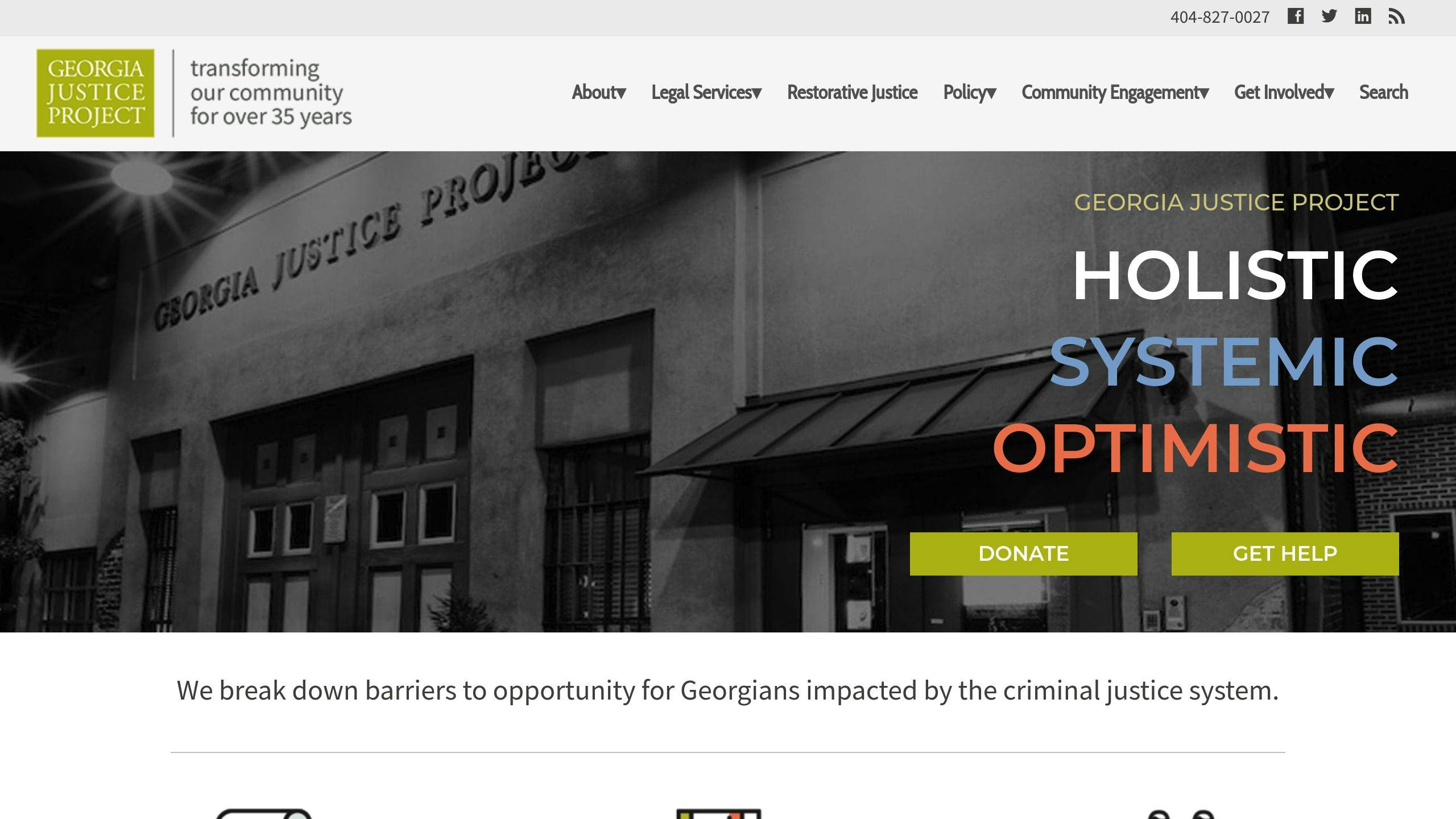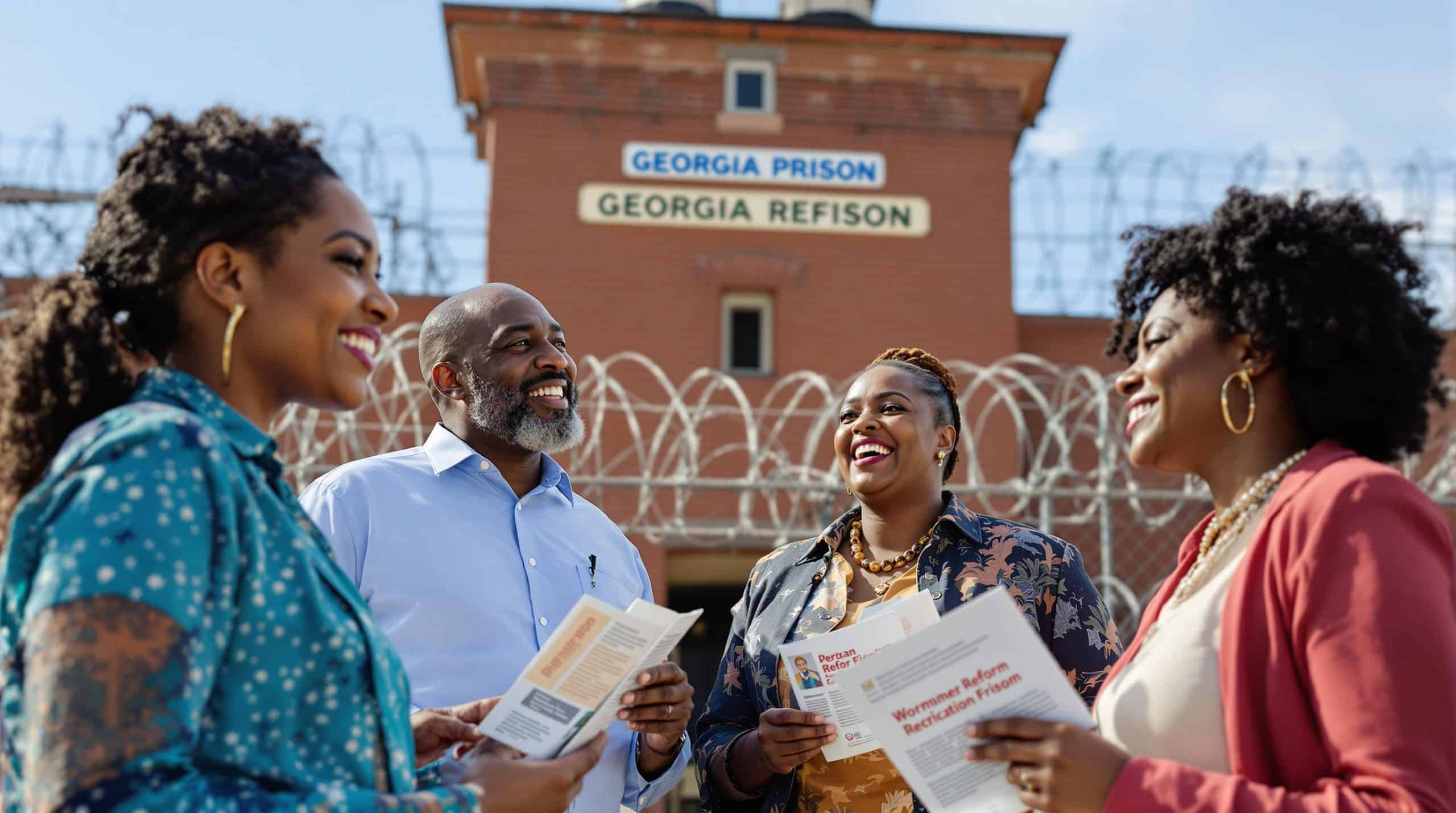Prison reform in Georgia addresses systemic issues like mass incarceration, racial disparities, and barriers to reentry. Here’s what you need to know:
- Key Problems: Over 64% of pretrial detainees remain jailed due to inability to pay bail. Georgia also has the largest probation system in the U.S., affecting 420,000 people. Marginalized groups face harsher sentencing and limited reentry opportunities.
- Reform Efforts: Advocacy groups like the Georgia Justice Project (GJP) have pushed for 23 legal changes since 2012, such as record-clearing laws and probation reforms. Programs like accountability courts have saved $75 million and reduced incarceration rates.
- How You Can Help: Use tools like Impact AI for targeted email campaigns, collaborate with organizations like Reform Georgia, and rely on data to advocate for change.
Mass Incarceration: Effects and Solutions
Challenges Facing Georgia’s Prison System
Georgia’s prison system is grappling with deep-rooted issues that go far beyond overcrowding. These problems affect not only those incarcerated but also the communities around them.
Current Conditions in Georgia Prisons
More than half of Georgia’s incarcerated individuals are serving time for non-violent offenses, and 64% of people in pretrial detention remain jailed simply because they can’t afford cash bail [2][4]. This creates a host of problems, including:
- Chronic understaffing in prisons
- Limited availability of rehabilitation programs
- Overburdened medical and mental health services
The Southern Center for Human Rights has pointed out the glaring lack of mental health care and substance abuse support, even though 80% of crimes in Georgia are tied to drugs or alcohol. Without proper care, these issues contribute to higher recidivism rates and worsen the conditions for those behind bars.
These systemic shortcomings hit marginalized groups the hardest, amplifying existing inequalities in Georgia’s criminal justice system.
Effects on Marginalized Groups
Communities of color and low-income individuals bear the brunt of Georgia’s prison system. Aggressive policing, unfair sentencing, and the challenges of reentry disproportionately affect these groups. Georgia’s probation system, which impacts 1 in 25 residents [4], adds another layer of financial strain and constant monitoring for many.
Racial disparities are evident in sentencing, with communities of color often receiving harsher penalties. Meanwhile, targeted policing continues to affect specific neighborhoods more than others. Advocacy groups are working to address these injustices through reform efforts and community-led solutions.
The Georgia Council on Criminal Justice Reform has outlined steps to tackle these challenges, including expanding drug and alcohol treatment programs, improving mental health services, introducing alternative sentencing options, and eliminating discriminatory practices within the system.
Real change will require both policy shifts and active participation from advocacy organizations and community leaders to push for systemic reforms.
Strategies to Support Prison Reform
Advocating for prison reform in Georgia involves blending modern tools, collaboration, and data-focused approaches to tackle systemic problems effectively.
Advocating Through Email Campaigns
Tools like Impact AI empower advocates to create personalized, targeted email campaigns while ensuring privacy. This tool helps streamline advocacy efforts by offering features such as:
- Custom content tailored to specific reform issues
- Strategic targeting of government officials
- Tracking tools for email delivery and engagement
- Organized contact lists of key decision-makers
While individual efforts are important, collective action often leads to broader, more impactful changes.
Working Together for Change
Collaboration is a powerful driver of reform. Reform Georgia, a nonprofit focused on criminal justice policy, highlights how partnerships can lead to real progress. By working together, organizations can:
- Share research and resources
- Coordinate advocacy campaigns for greater reach
- Present unified recommendations to policymakers
- Amplify the voices of affected communities
"The Georgia Justice Project has successfully advocated for 23 changes to Georgia law since 2012, including expanding access to record clearing and improving the First Offender law" [1].
Supporting Policy Changes with Data
Data plays a crucial role in advancing reform. The Georgia Council has used data to improve pretrial justice and reentry programs. Advocates can leverage statistics on employment barriers and pretrial detention to spotlight inefficiencies and inequities in the system.
Key statistics include:
| Issue | Impact |
|---|---|
| Collateral Consequences | 4.5 million Georgians face job-related barriers (72% of consequences are work-related) [1] |
| Pretrial Detention | 64% of detainees remain in custody because they cannot afford bail [4] |
The Council’s reports also highlight how accountability courts and alternative programs save money while addressing systemic issues [3]. When using data, emphasize both the human and financial benefits of reform.
Resources for Prison Reform Advocates
Modern prison reform efforts combine advanced tools like AI with traditional grassroots initiatives, while community-based resources offer training and support to drive meaningful change.
AI Tools for Advocacy
Impact AI is a platform designed to help advocates run efficient and targeted email campaigns. Its features include:
| Feature | Purpose |
|---|---|
| Content Creation | Provides customizable content while ensuring secure data management |
| Campaign Management | Simplifies outreach and monitors campaign performance |
The platform’s free plan is tailored specifically for Georgia prison reform efforts, making it a practical option for grassroots organizers and individual advocates. While AI tools make digital advocacy easier, community resources remain vital for building connections and offering the training needed for long-term progress.
Community Support Resources
The Southern Center for Human Rights provides an Advocacy Handbook, which includes training materials, strategies for direct action, and guidelines for supporting families impacted by incarceration. This resource equips advocates with the tools they need to tackle systemic issues and assist affected communities.
For those focused on data-driven approaches, the Georgia Council on Criminal Justice Reform offers up-to-date statistics and research to back reform initiatives.
Key Community Partners:
| Organization | Focus Area | Achievements |
|---|---|---|
| Georgia Justice Project | Record Clearing & Reentry | Supports 4.5 million Georgians with criminal records [1] |
| Reform Georgia | Mass Incarceration | Focuses on the country’s largest probation system, covering 420,000 individuals [4] |
| Southern Center for Human Rights | Legal Support & Training | Provides extensive training for advocates [2] |
sbb-itb-25113a2
Examples of Successful Prison Reform Efforts
The Georgia Justice Project (GJP) has been at the forefront of reforming criminal justice policies in Georgia, demonstrating how focused advocacy can lead to meaningful change.
Georgia Justice Project‘s Work

Through the Second Chance for Georgia campaign, GJP played a key role in passing Senate Bill 288. This law expanded opportunities for record-clearing, making it easier for millions of individuals with criminal records to reintegrate into society. The campaign brought together 67 organizations and congregations, showing the power of coalition-building in driving legislative success [1].
Here’s a look at some of GJP’s notable achievements:
| Reform Area | Impact |
|---|---|
| First Offender Law | Broadened eligibility and added protections |
| Probation System | Introduced automated early termination |
| Professional Licensing | Opened up access for individuals with records |
These efforts underline how collaboration and strategic planning can amplify advocacy results.
Local Reforms in Georgia
Beyond statewide initiatives, local reforms have also made a difference. The Justice Reinvestment Initiative (JRI), a data-driven approach, has redirected funds saved from corrections into public safety programs. One major milestone was the passage of Senate Bill 174 in 2017, which aimed to reduce lengthy probation terms and improve responses to violations [5].
Between 2012 and 2015, these reforms cut Georgia’s active felony probation population by 12% and saved $264 million in corrections costs. Of that, $57 million was reinvested in programs to reduce recidivism [5].
Reform Georgia has also been working on local changes, focusing on ending cash bail and decriminalizing cannabis possession. This work is particularly critical in a state with the largest probation system in the U.S., impacting around 420,000 people [4].
These efforts show how using data and targeted policies can lower correctional populations while enhancing public safety, creating room for even more progress in the future.
How to Take Action for Prison Reform
Steps to Start Advocating
To make a difference in prison reform, start by understanding the system and deciding how best to contribute.
- Learn and Research: Dive into reports and training materials from groups like the Georgia Justice Project and Southern Center for Human Rights. These resources can shape your campaigns and direct actions [2].
- Digital Advocacy: Use tools like Impact AI to create targeted email campaigns that deliver your prison reform message to decision-makers.
- Use Data Strategically: When reaching out to policymakers, back your arguments with data. For example, show how employment barriers affect communities economically or how alternative sentencing programs save money and improve outcomes.
By equipping yourself with knowledge and tools, you’ll be ready to work alongside established organizations to amplify your efforts.
Organizations to Connect With
Teaming up with experienced groups can help you navigate the challenges of prison reform while increasing your impact. Here are some key organizations in Georgia:
| Organization | Focus Area |
|---|---|
| Georgia Justice Project | Record clearing, policy reform |
| Reform Georgia | Cash bail reform, probation system |
| Southern Center for Human Rights | Prison conditions, legal advocacy |
For instance, the Georgia Council on Criminal Justice Reform has shown how accountability courts saved about $75 million in incarceration costs [3]. These organizations offer resources and support to help you apply proven strategies effectively.
Focusing on local reforms can also make a big difference. Across Georgia, cities and counties have implemented changes like ending cash bail and decriminalizing cannabis possession. These measures have reduced pretrial detention rates and cut related costs [4].
With 64% of people in Georgia’s jails being held in pretrial detention [4], there’s still much work to do. By working with these groups and using the tools available, you can play a part in creating meaningful change in Georgia’s prison system.
Conclusion: The Role of Advocacy in Prison Reform
Advocacy has been a driving force behind criminal justice reform in Georgia, leading to measurable progress. Since 2012, the Georgia Justice Project has successfully pushed for 23 legal changes, improving reentry opportunities and reducing correctional control for millions of people [1].
The need for ongoing reform is clear, especially when considering the long-term penalties that impact millions of Georgians. Employment remains a significant hurdle, with many individuals facing persistent barriers as they try to rebuild their lives [1].
Efforts like the Georgia Justice Project’s record-clearing campaigns and local initiatives targeting cash bail and probation reform are making a difference. For example, the Georgia Council on Criminal Justice Reform has shown how accountability courts can deliver results – saving around $75 million while assisting 9,100 people in fiscal year 2017 [3].
Programs like the Georgia Prisoner Reentry Initiative highlight how combining evidence-based strategies with grassroots activism can create meaningful change [3]. Organizations such as Reform Georgia and the Southern Center for Human Rights have been pivotal in addressing issues like pretrial detention and probation system reforms, helping communities across the state make progress [4].
The future of reform relies on the collective efforts of individuals and organizations. Through advocacy, policy changes, and community-driven support, reformers are steadily building momentum for a more just and equitable system. These efforts are proof that sustained advocacy can reshape lives, strengthen communities, and create a fairer justice system for everyone.
FAQs
What are the examples of prison reform?
Since 2012, Georgia has seen 23 legal changes aimed at improving the criminal justice system. These include expanding record-clearing processes and strengthening protections for first-time offenders. Such efforts have opened doors to better employment and housing opportunities, while also improving the First Offender Law and simplifying probation termination procedures.
Local efforts have tackled broader issues by eliminating cash bail in some areas, reducing penalties for cannabis possession, and introducing accountability courts. These courts have been effective, saving $75 million and assisting 9,100 individuals in fiscal year 2017 [3].
"The Georgia Council on Criminal Justice Reform has shown how accountability courts can deliver results – combining evidence-based strategies with grassroots activism to create meaningful change", states a recent evaluation of Georgia’s reform initiatives [3].
The Georgia Prisoner Reentry Initiative (GA-PRI) prioritizes reentry strategies that reduce repeat offenses and enhance public safety. At the same time, Reform Georgia is working to eliminate policies that disproportionately harm low-income individuals and to address the state’s extensive probation system, which currently oversees 420,000 people [4].
These examples highlight how focused reforms and persistent advocacy can tackle systemic issues and pave the way for broader improvements in Georgia’s criminal justice system.

